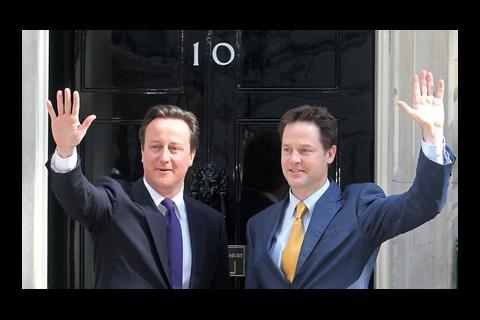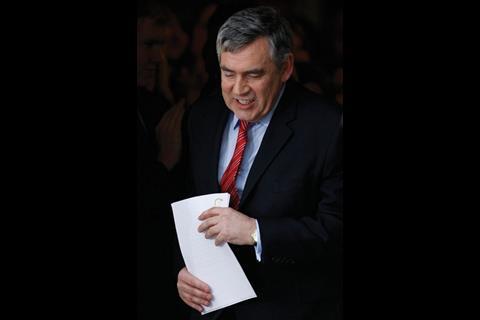Sarah Richardson and Roxane McMeeken look at the consequences of a LibŌĆōCon coalition
So, almost a week after the electorate spoke, the main parties have worked out what it said: David Cameron will be prime minister, and the Conservatives and Liberal Democrats will enter a coalition. But as the nation peers at this weird-looking political animal, the reality of a hung parliament and coalition government is only just starting to emerge for the construction industry ŌĆō and it doesnŌĆÖt look good.
Graham Kean, head of public at EC Harris, says whichever deal was struck between the parties, one thing was certain: ŌĆ£There is going to be a time of policy review that will result in many capital projects being delayed for a few months until priorities are reset.ŌĆØ
It is widely accepted that the hung parliament will lead to a longer delay in policy decisions than a Conservative win would have done ŌĆō although the make up of the new government means that this is unlikely to afford the industry much of a stay of execution.
The Conservatives will push ahead with their manifesto commitment of a budget within 50 days, but their axe-swinging in some sectors may be circumscribed, or at the least delayed, by the Lib Dems.
The need to achieve consensus on spending priorities, however, has its own problems for the industry. As far as individual contracts go, the delay while ratification is sought from a new parliament will be exacerbated by the lack of agreement over delivery and priorities. Below we assess what the outcome means for constructionŌĆÖs key sectors, businesses and workload.
Hanging matters
What effect will the unlikely coalition have on eight key policy areas?
Housing
The Tory pledge to scrap national building targets would go ahead, as both parties favour a localised approach. This would cause some disruption, and that may be exacerbated by the Lib DemsŌĆÖ pledge to impose VAT on new homes in order to reduce the rate for repairs. Another cause for confusion is what happens to home information packs (Hips) ŌĆō both parties want to scrap them, but the Lib Dems favour retaining their energy performance certificates. James Thomas, head of residential investment at Jones Lang LaSalle, has warned that some sellers will delay marketing properties while they await clarity over Hips. The agent predicts that house prices will remain static or decline in the short term, and predicts lower transaction levels.
Education
The Conservatives are understood to have agreed to grant financial close to some schools contracts going through the procurement process at the moment; these will need to be re-ratified under a joint administration, causing a short delay. In the medium term, the Lib Dems have accused the Conservatives of wanting to cut money from the school building programme, and are likely to oppose any redirection of funds from building projects to finance the creation of free schools. So, although building work may be more protected than under a solely Conservative administration, be prepared for wrangling over strategy.
Health
This sector has been ringfenced by the Conservatives, who want to increase spending, but the emphasis is likely to be on frontline health services rather than new buildings. Lib Dem involvement would not change this.
Greening existing housing
This will receive a boost. Both parties have identified greening existing stock as a priority, and it doesnŌĆÖt involve approving large chunks of capital expenditure, so the programme can move ahead swiftly.
Nuclear
The parties have agreed ŌĆ£agreed to disagreeŌĆØ on the future of nuclear in the UK. Paul Rice, a partner in law firm Pinsent Masons, said: ŌĆ£Unfortunately for UK plc, and the utilities that have committed significant sums to the future of the UK energy supply, we will have to wait quite a bit longer for a clear energy policy.ŌĆØ That said, if it comes to a parliamentary vote, there is enough support in the Conservative and Labour parties for nuclear new build to carry it through without any further delay.
Renewable energy
Both parties support renewable energy, so the hung parliament will have little effect on that. However, both also want to shake up the planning system. A particular threat is the Tory plan to dissolve the Independent Planning Commission, which approves large wind farms. Although they say this is aimed at speeding up the process, in the short term it would mean delays while a new system was created. In the long term, the localism favoured by both parties risks fostering nimbyism.
Private sector development
Business needs stability and access to finance, and hung parliaments are not conducive to this: this means financial planning will be difficult and banks will be less willing to lend. The ConŌĆōLib coalition, though, has a working majority in parliament, and may be able to foster more confidence from the banks than a Conservative minority or Lab-Lib set up would have.
Transport
The third runway at Heathrow was axed within hours of the new regime seizing power. Nor is Crossrail safe. Vince Cable has said the project is ŌĆ£not a key priorityŌĆØ, and the Tories could scale back, extend or freeze it. Hugh Blackwood, chief executive of Scott Wilson, says: ŌĆ£The Tories may say that now theyŌĆÖve seen the books theyŌĆÖre changing their view.ŌĆØ The first phase completes in the middle of next year, which might be a convenient point to pause the project. High-speed rail is backed by both parties and so has a good chance of being approved.
What the coalition means for ŌĆ” business
Tax
You donŌĆÖt have to be grand wizard of high finance to know that taxes are on the way up. The Tories would cut corporation tax to 25p and both they and the Lib Dems want to scrap LabourŌĆÖs plans to raise National Insurance 1%. That said, the official line is theyŌĆÖll stop it ŌĆ£when resources allowŌĆØ.
Clive Lewis, head of SME issues at the Chartered Institute of Accountants, England and Wales, says: ŌĆ£A Lab-Lib coalition would have been more likely to address the deficit through tax rises. However, since tax rises are a faster route to raising money than spending cuts, a ConŌĆōLib government will raise some taxes, certainly.ŌĆØ He believes VAT will ŌĆ£almost certainlyŌĆØ go up, under any regime, most likely to 20%.
SMEs
The Tory plan to decrease corporation tax to 20p for SMEs could prove a boon. However, Lewis warns that this would be funded by cutting benefits for smaller businesses, such as the ┬Ż50,000 investment allowance scheme. Although the tax cut would apply to all businesses, those that were benefiting from such schemes could be worse off.
The new government has agreed to try to encourage banks to lend more. However, there is no agreement yet on how to do this. The parties will look at the Conservative proposal for a loan guarantee scheme and the Lib DemsŌĆÖ idea of lending targets for nationalised banks and decide which is best.
What the coalition means forŌĆ” public sector contracts
The only PPP/PFI contracts that are completely safe are those that have reached financial close.
Once the election was announced and public sector clients became unable to approve contracts, it is understood that some spending quangos were given the nod by Labour and Conservatives to continue working on approving certain deals so that they would be ready to go once a new government was formed. These deals will now need to be re-ratified by the government, leading to a delay ŌĆō although theyŌĆÖre a pretty sure bet to go ahead. See page 9 for more details on this.
Any PPP/PFI deal at preferred bidder stage can technically still be scrapped ŌĆō the Conservatives, for example, have refused to guarantee any ║┌Č┤╔ńŪ° Schools for the Future work that has not reached financial close. In reality, many of these contracts will go ahead, as taking projects away after money has been spent working them up will be politically difficult, as will the outcry from councils. But some may be scaled back, or at least delayed, while the new administration works out its policy on spending.
Any non-PFI work that has been signed is probably safe, but any work, whether PFI or not, that has been tendered but not appointed is in danger. The less far down the procurement route a deal is, the more chance it will be scrapped or reviewed ŌĆō and those projects that have had a commitment to funding but have not yet released an Official Journal notice are looking shaky.
What happens now?
The new government technically has a mandate to run for five years, and it seems the parties want it to run for that long, as they are proposing to pass legislation fixing the next election date for May 2015. This would be good news in one sense for the industry: the prospect of another election in a few months time would mean yet more uncertainty for private sector investors as well as for public sector contracts; that would be deeply worrying to the construction industry.
However, a durable government means that spending cuts are likely to happen swiftly, thereby allowing as much time as possible for the electorate to forgive and forget unpopular decisions before they begin queueing outside polling stations again. An important element in this process will be George OsborneŌĆÖs first budget, expected within 50 days, and the next Comprehensive Spending Review (CSR), due in the autumn. The current spending round will expire next April, so the next CSR will provide the clearest forecast for public sector workloads over the next few years.
However, there is still a risk that the government will not last the course. Simon Jenkins, a political commentator in The Guardian, said on Tuesday, just before the coalition was announced: ŌĆ£This is a very, very fragile state of affairs. IŌĆÖd be amazed if there wasnŌĆÖt another general election within a year.ŌĆØ This is because of the lack of ideological fit between the parties, and therefore the wear and tear of sharing the same government.
Going up
- Green refurbishment ŌĆō one thing on which all the parties, amazingly, agree.
- Jack Pringle, one of ║┌Č┤╔ńŪ°ŌĆÖs floating voters, who wished he could vote for a hung parliament
- Come Dine With Me ŌĆō the appearance of Edwina Currie among others on Channel 4ŌĆÖs alternative election night proves this format for public entertaining has become an essential feature for virtually any occasion (including, of course, ║┌Č┤╔ńŪ°ŌĆÖs last Christmas special)
- The anti-Heathrow expansion lobby ŌĆō victory for the Green party leader Caroline Lucas in Brighton Pavilion and prominent Conservative campaigner Zac Goldsmith in Richmond, added to the Conservatives strong showing, will pile pressure on the project.
- Conservative candidate Ester McVey, who swapped media for construction (and politics), successfully wrested Wirral West from Labour
Going down
- Gordon Brown ŌĆō the final curtain has come down on the prime minister who never won a general election
- Jim Knight, former schools minister, who helped to drive ║┌Č┤╔ńŪ° Schools for the Future, lost his seat
- Richard Bull, the Lib Dem candidate featured on ║┌Č┤╔ńŪ°ŌĆÖs cover with his cockatiel, failed to take the construction-heavy target seat of Derbyshire North East; Labour held it
- HIPS ŌĆō Both Tories and Lib Dems want them scrapped




























1 Readers' comment